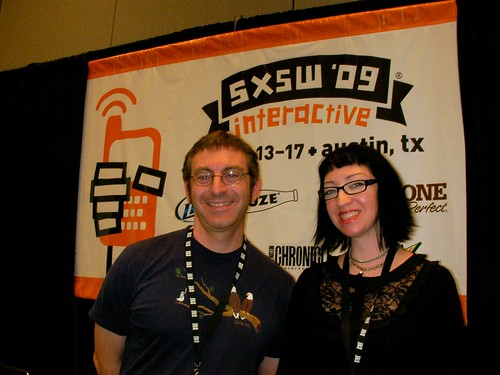SXSWi 2009: Sexual Exploitation, Sexual Expression and Self-Defense
Last March I went to SXSWi 2009. I posted the notes from two of the days, but conference exhaustion got in the way of me posting the notes from the last three days. After much delay, here they are.
Sexual Exploitation, Sexual Expression and Self-Defense – Room 5A
Monday, March 16th
5:00 pm – 6:00 pm
Sexual exploitation and sexual expression are inherent in everyone’s online experiences, whether intentional or not. Bloggers, community site users, community managers, web celebs — everyone will eventually face a sexuality-related crisis where knowing the difference, and how to protect yourself is crucial. From the personal to the professional, we will demonstrate and discuss instances, legal realities and tactics for survival and success. We’ll also cover the import and impact of the Lori Drew/MySpace Suicide trial (where Drew was convicted of a federal misdemeanor for violating MySpace’s terms of service in order to bully a teenager), Missouri and California’s new cyberbullying laws — and how it all applies to sexual expression and sexual attacks for individuals and social network websites.
Violet Blue
Jason Schultz
Violet Blue:
Sexual harrassment is a big ball of yarn. We’re going to unravel it today.
People share stories of their sexual encounters online, creating dating profile, provocative images, Twittering sexual things, there are a variety of different ways of people expressing themselves online.
When do we get unintentionally by posting sexually. Other people might write about you. Writing about politics. Pictures of you that you may not realize are fetishy. There is a lot of ambiguity. Clicking a gender box can put you in one box or another.It can be as simple as filling out a form.
Real world harassment: inappropriate touching, name calling
It’s context. What might feel like harassment from one person’s point of view might not feel like harassment from another.
Online harassment: Comments on blogs, showing interest in one person’s life that you haven’t given permission to, unwanted advances, sexual hate blogs, social network exploitation, We Hate XXX blogs, trolls (repetition, threats), it can also be posting too many positive comments, multiple accounts to target the person, posting publicly available information.
Jason Schultz:
There are certain themes, privacy, control, threats and harassment, threat of reprisal.
Violet Blue:
Consulted an HR person about sexual harassment in the workplace. What translates to the online world?
Jefferson sex blogger who is in a custody battle.
We’re seeing a bunch of different ways that online sexual expression is being used to harm peole.
Jason Schultz:
Megan Meir’s MySpace page she committed suicide. When you register for MySpace, you are prohibited from giving fake information. By giving a false name, you “hacked” into the system. It’s still a contentious case. This isn’t a good thing, despite the fact that we would like to get that mother.
Online doesn’t have as much accountability. The flip side is a lot of people can hide online when they don’t feel safe in the real world.
Violet Blue:
The laws are not catching up. Social Networks are turning a blind eye. They don’t want to deal with it. What do we do?
What is your goal? You’re being attacked. Defend yourself? Restore your reputation? Get revenge?
Remove yourself. A lot of it is you at your computer. Look at the situation objectively. It is threatening. Step out of it? Make a list of what you want.
- Choose to ignore it. Determine the threat level. Will it cost me my job? Will it cost me my relationship? Are they threatening my life? If it’s name-calling, choose to ignore. If it’s threats, you can’t ignore it.
If someone brings something to your attention, especially someone you don’t know, you need to acknowledge it.
- Ignore
- Report
- Record
- Strike back?
- Get help?
- Project yourself
- Get social support
Always report. It leaves a trail.
Record EVERYTHING. You can put up a wiki to track what her stalker is doing. Stalk your stalker in reverse.Take a screen capture before the person would delete her tweets.The police will not understand what you’re talking about. Print out the email headers of the emails that they send you.
They like to be in the shadows. It brings them out into the open to keep a file on them.
There is power in telling your story. There is no public space online. There is always a corporate entity above us.
Protect yourself: There is no such thing as Un-Publish. Keep that in mind when you are protecting yourself. You can’t take that stuff back.
If you have something to hide, then you need to keep it mind. Out yourself first. Don’t play dirty when you do it.
Don’t forget what you ARE online for. Google will remember you for that.
You can out-SEO your attacker. This is only one little part of the pie that is you.
Being open without secrets is the SAFEST way to be. More fame will make you more vulnerable. Don’t sex blog at work!

